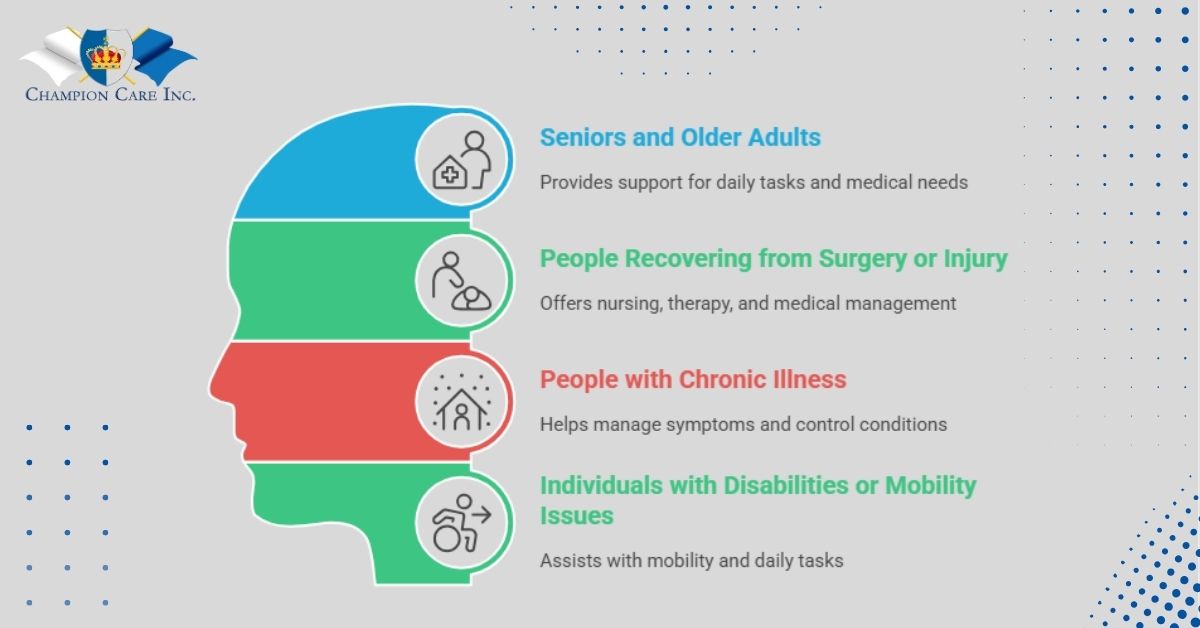Many people now prefer care at home over hospitalization. Home health care lets people get help where they feel safe at home. They don’t have to move or adjust to a new place. That’s a significant reason why more families choose this type of care.
People live longer now. Many also deal with health problems that don’t go away. Home care can provide expert support without requiring extended hospital stays. It also works well after surgery or injury.

In this blog, we’ll break down what home health care means. We’ll show who it helps and what services it covers. You’ll also learn how this care can help people heal faster, feel better, and live more freely. If you care for a parent, a partner, or even yourself, this guide will provide you with clear answers and valuable tips.
What Home Health Care Means
Home healthcare means receiving skilled medical assistance in your own home. It’s not the same as general home care. This service is for individuals who require treatment from trained nurses or therapists but don’t need to be hospitalized.
What Is Home Health Care?
Home health care includes care that doctors approve and trained professionals provide. Nurses, physical therapists, and home health aides visit patients in their homes to assist them in healing or managing long-term health issues. It can include checking vital signs, administering medication, performing therapy, or changing dressings.
This type of care helps people recover after surgery, illness, or injury. It also supports individuals with chronic diseases who require regular assistance. These services are part of a treatment plan that doctors review and adjust as needed.
Home healthcare is not the same as non-medical assistance.
Home healthcare is not the same as non-medical assistance. It doesn’t include cooking, cleaning, or just keeping someone company. Those are part of personal care or companion care.
So, if someone needs medical support, such as wound care or therapy, home health care is the right choice. However, if they only require assistance with meals or bathing, that constitutes non-medical care.
Key Benefits of Home Health Care
Home health care helps people live safely and comfortably in their own homes. It supports health, saves money, and makes life easier for both patients and their families.
Why So Many People Choose Home Health Care
1. Comfort of Home
People heal better when they feel relaxed. Staying at home means sleeping in your bed, being near loved ones, and keeping your routine. That comfort helps both the mind and body.
2. One-on-One Care
Home care teams follow a care plan tailored specifically to the patient. This means the care is more personal and focused. Nurses and therapists can spot problems early and adjust care as needed.
3. Fewer Hospital Visits
With the proper care at home, patients avoid repeat hospital stays. That reduces stress and lowers the risk of infection. This also leads to better health results.
4. Saves Money
Hospital care is costly. Home care typically costs less and still provides high-quality medical assistance. Many families find it’s a better fit for their budget.
5. Family Can Stay Involved
Loved ones can stay updated and take part in care. This fosters trust and keeps everyone aligned.
Who Benefits Most from Home Health Care
Home health care suits many people. It helps those who need extra support but want to stay at home.

Seniors and Older Adults
Older people often face health challenges or mobility issues. Home care allows them to receive help without having to move to a nursing home. It supports daily tasks and medical needs safely.
People Recovering from Surgery or Injury
After surgery or injury, patients require skilled care for effective healing. Home healthcare offers nursing, therapy, and medical management, helping patients recover well without the need for hospital stays.
People with Chronic Illness
Those living with long-term illnesses like diabetes, heart disease, or COPD need regular care. Home health services help manage symptoms and keep conditions under control.
Individuals with Disabilities or Mobility Issues
Individuals who struggle with mobility or managing daily tasks can benefit from the assistance of home health aides and therapists. The care makes life easier and safer. Using home health care means getting the right help at the right time. It supports independence and improves quality of life.
What Services Do Home Health Agencies Offer?
Home health care includes many services. These services offer medical and personal support to individuals without requiring them to leave their homes.
Skilled Nursing Care
Nurses visit to administer medicine, assess wounds, and monitor vital signs, such as blood pressure and temperature. They follow the doctor’s instructions closely.
Therapy Services
Physical, occupational, and speech therapists come to help patients regain strength and skills. Therapy helps with walking, daily tasks, and communication.
Medication Management
Home health care workers help patients take their medicines on time. They explain how and when to use each medicine safely and effectively.
Help with Daily Tasks
Some agencies offer assistance with activities such as eating, bathing, dressing, and mobility. This support is for individuals who require assistance but don’t require complete medical care.
Read this article to learn what tasks home health aides can’t perform. Understand the clear limits between medical duties and daily support in home care settings.
Monitoring and Safety
Home health aides monitor for any changes in a person’s health. They report to nurses and doctors to keep patients safe and healthy. These services work together to help people recover more quickly and live better at home.
When Should You Choose Home Health Care?
Knowing when to get home health care can make a significant difference. It helps patients get the support they need before problems grow.
Watch for Signs of Needing Help
If a loved one struggles with daily tasks like bathing, eating, or moving around, it’s time to think about Senior Home Care Services. Additionally, if they forget to take their medicine or have trouble managing their health conditions, help can improve their safety.
Doctor’s Advice
Doctors often recommend home health care after surgery or a hospital stay. They want patients to heal well at home with the proper care.
Safety Concerns at Home
If a person frequently falls or experiences memory problems, home healthcare can provide supervision and help reduce these risks. This care keeps the home safer for everyone.
Choosing home health care early can help prevent more significant health issues and hospital visits. It gives peace of mind to both patients and their families.
How to Choose the Right Home Health Care Provider
Selecting the right home healthcare provider is crucial. The right team offers safe, skilled, and kind care.
Look for Licensing and Experience
Ensure the relevant health authorities license the agency. Experienced staff know how to handle different medical needs safely.
Ask About Staff Training and Background
Good agencies train their nurses and aides well. They also check backgrounds to ensure trustworthiness.
Find a Local Provider
Choosing a nearby agency means quicker response times and easier communication. Local providers, such as Champion Care Inc., are familiar with the community and can establish a strong level of trust.
Talk About Services Offered
Ask if they provide the services your loved one needs, such as a home care assistant, therapy, medication assistance, Caregivers, or daily support.
Read this to learn what caregivers do for the elderly, support, safety, daily care, and compassion that help seniors live better at home.
Read Reviews and Get References
Look for feedback from other families. Honest reviews can help you choose the best fit for your needs. Selecting the right home healthcare team can make a significant difference in recovery and overall quality of life.
Real-Life Impact: Stories That Show the Difference
Hearing real stories helps us understand how home health care changes lives. Many families feel relieved when their loved ones get help at home.
A Story of Recovery
After surgery, Mr. Ahmed needed nursing care and therapy. His home health team helped him regain strength while staying in his own home. He avoided another hospital stay and felt more comfortable.
Support for Chronic Illness
Mrs. Rahman has diabetes and heart problems. Home healthcare helps her manage her medications and check her health regularly. This support keeps her steady and out of the hospital.
Peace of Mind for Families
Families find comfort knowing experts visit their loved ones. They can ask questions and closely monitor the care. This trust helps reduce worry and stress. These stories demonstrate how home health care enables individuals to recover more effectively and live more safely.
Wrap-Up: Why Caring at Home Makes Sense
Home health care helps people stay safe, heal well, and live comfortably in their own homes. It offers personal care from skilled nurses and therapists. This care reduces hospital visits, allowing families to stay close.
Choosing home health care means getting the right help without having to leave home. It saves money and improves the quality of life. Loved ones feel more secure knowing experts support them daily.
If you’re looking for trusted home health care near you, Champion Care is here to help. Our team offers skilled nursing, therapy, and personal support tailored to your needs. We work with you and your family to make sure care fits your life.
Home healthcare is a wise choice for anyone needing medical assistance at home. It keeps patients healthy and independent. Contact Champion Care Inc. today to learn more or schedule a complimentary consultation.
Frequently Asked Questions (FAQs)
What is the primary goal of home health care?
The primary goal is to provide skilled medical care at home, enabling patients to heal, manage their illnesses, and stay safe without requiring hospitalization.
Is home health care better than a nursing home?
Home healthcare enables individuals to remain in their own homes. Many people prefer this option for its comfort and personalized attention. Nursing homes provide specialized care for individuals who require full-time supervision and support.
How much does home health care cost?
Costs vary based on services and length of care. Home care often costs less than hospital stays. Insurance or Medicare may cover some or all of the cost.
Can I choose who provides care at home?
Yes. Many agencies allow you to choose nurses or aides with whom you feel comfortable. This helps build trust and better care.
Does Medicare cover home health care?
Medicare covers home health care when a doctor approves it. Coverage includes skilled nursing, therapy, and some medical equipment.

